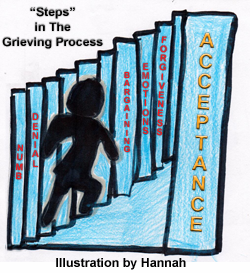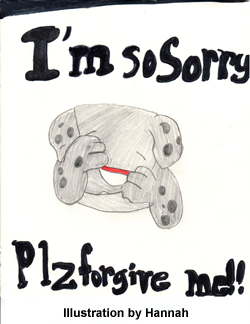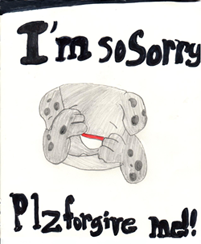 For the past few months, I have been writing on the different steps most commonly associated with The Grieving Process. Just briefly the steps that I have covered, as my granddaughter Hannah has illustrated, are:
For the past few months, I have been writing on the different steps most commonly associated with The Grieving Process. Just briefly the steps that I have covered, as my granddaughter Hannah has illustrated, are:
Step 1. Numb: The state of shock immediately following a loss. You might say it works like a tranquilizer that helps you get through the initial onslaught of a loss.
Step 2. Denial: Defense mechanism used to block pain.
Step 3. Bargaining: Trying to cut a deal with God to get out of a situation quickly rather than walking through the pain associated with the loss and feeling His comfort.
Step 4. Emotions: Response and reactions to life’s circumstances.
Step 5. Forgiveness: The act of releasing others and yourself from hurts in your life.
May I quickly point out that there is no systematic order in which an individual goes through the above steps. You may also “bounce” in an out of a step several times. Do not be discouraged when that happens. Remember that emotional healing is a process or as it is sometimes called, a journey.
Today, we have reached Step 6: ACCEPTANCE. (The last step.)
Melba Berkheimer, my friend and mentor of The Grieving Process, related how she was progressing through all the emotions surrounding her mother’s death. Six months passed and all of a sudden one day, “the little girl inside of me rose up and the little girl was lonely; the little girl was sad because her Mother wasn’t there anymore, and I cried and cried.”
The next week the same feelings came again. This time I cried out, “Lord, I hurt, help me!” At that moment, the word nostalgia came into my mind. I looked up the meaning of nostalgia in the dictionary and discovered that it meant an abnormal yearning to return to something in the past.
Nosta in Greek means to return home. Algia in Greek means pain. And that’s what I wanted to do-go back like a little girl. I felt like I was 10 years old inside and Mother was 36, and she was going to make it right. Inside of me I was hurting and wanted to go back home. At that point, I knew I had to accept her death, not approve of it, but accept it.
And that’s what we have to do with all losses in our lives.
But, keep this in mind: There is a big difference between ACCEPT and APPROVAL.
Acceptance means accepting life at a new place
and begin the process of moving forward.
It does not mean approval.
We sometimes think we have to approve of someone or something in order to accept the situation or or someone, but that is not true. We have to accept a lot of things in life, but we don’t have to approve of them.
Think of it this way: If your body gets a transplant of a particular organ and your body accepts the transplant, you have a new life. But, if your body rejects it, you don’t have a new life. So it is with situations in our lives; acceptance is what we have to do in order to have a new life.
Perhaps you are saying at this point, “How can I accept this situation; after all, it’s not supposed to be this way!” God is probably agreeing with you by saying, “No, it’s not supposed to be this way, but go ahead and agree that this is the way it is.”
You do not approve it, but you are agreeing with it so that you can accept it. Otherwise there is a portion of you going this way inside and another portion going the other way. When things go opposite one another, it produces friction. And that’s exactly what is going on inside; friction and turmoil because you’re saying, “I can’t accept it.” Begin to go the same direction by accepting it, even though you don’t approve of it.
Sometimes you will even feel like you are a traitor to the cause because you have to accept it. You are not a traitor. You are just accepting the facts of reality for your peace.
There are 2 kinds of acceptance: Seasonal and Permanent. Recognizing the difference is of great value.
Seasonal Acceptance: Accepting a present situation does not mean accepting it as a permanent situation. There are times you have to accept it for a season. A lot of people feel like “I have really messed up my life.” Perhaps something has happened and they think that they have messed their life up and they will never get through the situation. It is probably a seasonal thing and all things have a season to go through. And then the harvest is over and you’ll be able to plant new seeds and new life into the circumstances of your life.
Permanent Acceptance: Sometimes with acceptance, there will be no solution. God wants us to learn to accept it just like it is. In times like this, God is saying, “I will walk with you and we will detour around the situation.”
How Can You Know When You’ve Reached Acceptance?
- When you can talk about the loss freely and it just doesn’t STING like it once did.
- When the time comes that you are reaching out to help others and you are no longer drawn back into the prison with your own loss.
- When you begin to have fond memories of the loss inside. Fond memories come as a result of things you have learned and it has brought good into your life. What has happened is that you have assimilated the loss.
My friends, I’d like to leave you with a challenge from Acts l, verses 4 and 8. As Jesus was about to ascend back into heaven, He said to His disciples:
Do not depart from Jerusalem, wait for the promise of the Father. You shall receive power after the Holy Ghost has come upon you. After that, you shall be my witnesses.
Why did Jesus instruct them to go to Jerusalem? I am not sure, but perhaps Jesus knew it was the place the disciples might have felt defeated as they watched Him being crucified there, and He wanted them to return and receive power at the very place they thought they were defeated.
Likewise—
Your loss is not your place of defeat.
It is a place where the Holy Spirit can empower you
to go forward into a new beginning in your life.
It is also the place where you will receive the power
to comfort others as He has comforted you in your time.
Blessings to you as you go forward.
 “We’re back!” “We’re back!”
“We’re back!” “We’re back!”










